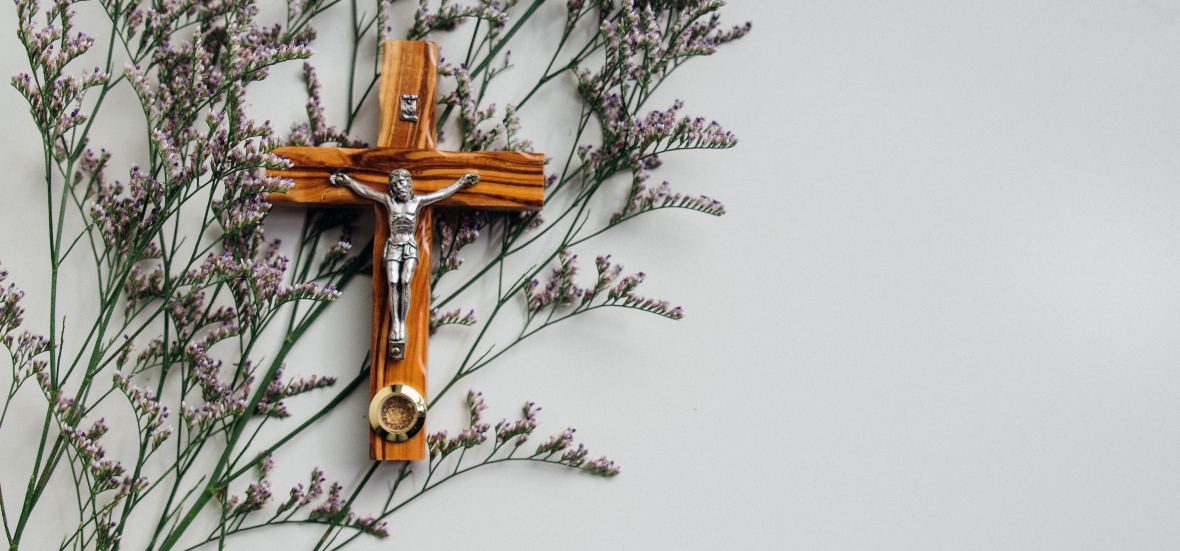
Shannon Whitmore shares her experiences as a Catholic who has suffered with an eating disorder.
I started to take my faith seriously in high school. By the time I graduated, I was preparing to attend a Catholic university in the fall, where I would major in theology. Four years later, I pursued a Master’s degree in the same field. I’ve worked in ministry, as well as volunteered as a catechist and a small group leader in youth ministry. To say that I take my Catholic faith seriously would probably be considered an understatement.
I started to listen to the lies about my body when I was in high school too. I was in my junior-year health class when a young woman called me “big-boned,” a thoughtless comment that marked the beginning of a decade-long struggle with body image issues and an eating disorder. During college and while I pursued my master’s degree, I was regularly starving myself, periodically bingeing, exercising to punish myself, and occasionally sneaking diet pills. On some level, I knew I had a problem, but I was too proud and confused to ask for help.
I was too proud to admit that I wasn’t as perfect as people believed me to be. I craved the compliments, longed for the lingering looks, even enjoyed the occasional whistles and cat-calls. I loved what they all meant. I wanted to be beautiful, perfect, in control. Admitting that I had a problem would have meant admitting that I hated myself and often felt out of control. If I asked for help, my carefully crafted facade would have come crashing down around me.
I was also confused. The deeper I fell in love with God, the less sense my struggles made to me. How could I hate myself when God loved me? How could I continue to struggle when I had professed my faith and love for Jesus Christ? Shouldn’t my struggles have decreased as my faith increased? Was I not praying hard enough? If I admitted that I was struggling with body image issues, was I also admitting that my return to the Catholic faith wasn’t as earnest as it had originally appeared?
Over the next decade, I attended countless conferences, retreats, healing sessions, and charismatic prayer opportunities. I was prayed over, prayed with, and prayed for. I was invited to give myself over to Christ for healing, asked to lay my burdens down at the feet of Christ. I did it all, yet my struggles remained. I was offering it all up, so why wasn’t God taking it from me?
As I’ve gotten older, I’ve come to accept and really appreciate the enormous power of prayer and intercession. I’ve seen what it can do during times of struggle and in times of joy and celebration. I’ve seen communities join together during times of immense tragedy because of prayer. I’ve seen people receive both physical and spiritual healing from prayer and intercession. Prayer is a powerful weapon.
But I’ve also witnessed countless people abandon their faith because they believed that their prayers had not been answered, or worse, not even heard. I’ve known mothers to pray every day for a miracle, only to have their child die and their faith go with them. I’ve seen devout Christians leave the Church because their lives were not as perfect as they'd expected they would be.
I consider myself blessed that I did not lose my faith in the midst of my struggles. I didn’t always understand God’s will or His plans for me, but I never doubted that He heard my prayers or that He desired to comfort me in my afflictions. But as I’ve gotten older, I’ve come to understand a few things.
Not all prayers are answered as we hope, but God always hears us. Even Jesus asked His Father that His cup might be taken from Him. That cup? The crucifixion. Jesus, the Son of God, asked that He not die, if possible. But we know how that story ends- on the cross. Did God not hear His Son’s prayer? Of course He did. But as the rest of Christ’s prayer went, Your Will be done. And God’s will? That we might all be saved. Christ was asked to bear His sufferings and death so that we might be saved. His suffering was redemptive. And what’s more? His suffering has enabled our sufferings to be redemptive as well. We are all invited to unite our crosses with that of Christ.
Our faith does not promise us a struggle-free life. It ensures that we have the strength to endure our struggles, and the courage to carry our crosses. We remember that Jesus invited us to lay down our burdens, but He also asked us to take up our crosses. Some of us will be asked to carry a cross throughout our entire lives; others will be granted a respite from the burden. Some of us will be given a miracle; others will be given a cross to bear all our lives. Some of us will be given physical healing; others will be given strength or a Simon-figure to make our crosses feel lighter. But regardless of the answer to our prayers, I am confident that we have all been heard.
Becoming Christian does not mean the end of your suffering. It means that your suffering will have meaning. It can have a purpose. Accepting Christ means accepting the crosses in our lives. It means taking up our crosses and following Him.
But the good news? We are not expected to carry our crosses alone. We are invited to unite them with the cross of Christ, and oftentimes the answer to our prayers for deliverance is a Simon of Cyrene to help lessen our burden. Our crosses can take a variety of forms: physical illness or disability, difficult circumstances, or mental illness. Our crosses might not always be visible, but that doesn’t make them any less difficult to carry. If anything, these invisible crosses are more difficult because others won’t necessarily see them.
And that's why sometimes asking for help from God means asking for help from another person. Our Simon might not know that they are needed until they are asked. At some point in our lives, we will all carry a cross, we will all fall beneath the weight of that cross, and we will all need help standing back up. And at some point in our lives, we will also be asked to be Simon, the answer to another person’s prayers. This is the beauty of the Christian life: not that it is without suffering, but that it is without meaningless suffering. There is glory to be found in the cross.
Mary Help of Christians, pray for us!
What are some of the crosses in your life? How has God lightened the load of the crosses that you have been asked to bear?
Copyright 2020 Shannon Whitmore
Image by Laura Allen (2019), Unsplash
About the Author

Shannon Whitmore
Shannon Whitmore currently lives in northwestern Virginia with her husband, Andrew, and their two children, John and Felicity. When she is not caring for her children, Shannon enjoys writing for her blog, Love in the Little Things, reading fiction, and working in youth ministry. She has experience serving in the areas of youth ministry, religious education, sacramental preparation, and marriage enrichment.


.png?width=1806&height=731&name=CatholicMom_hcfm_logo1_pos_871c_2728c%20(002).png)
Comments